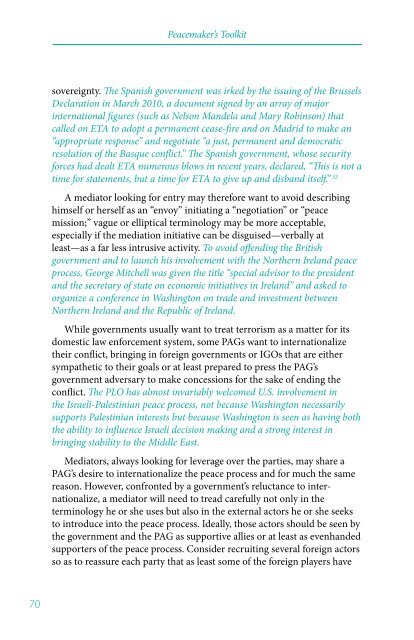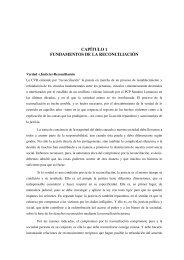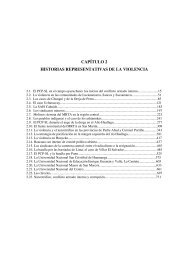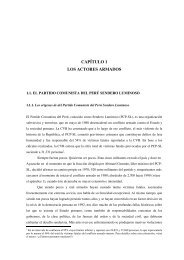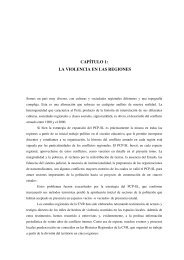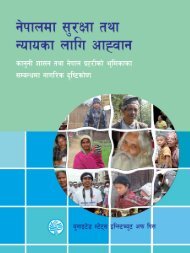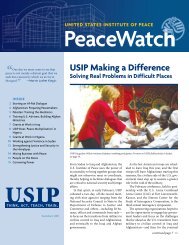Talking to Groups that Use Terror.pdf - United States Institute of Peace
Talking to Groups that Use Terror.pdf - United States Institute of Peace
Talking to Groups that Use Terror.pdf - United States Institute of Peace
Create successful ePaper yourself
Turn your PDF publications into a flip-book with our unique Google optimized e-Paper software.
<strong>Peace</strong>maker’s Toolkitsovereignty. The Spanish government was irked by the issuing <strong>of</strong> the BrusselsDeclaration in March 2010, a document signed by an array <strong>of</strong> majorinternational figures (such as Nelson Mandela and Mary Robinson) <strong>that</strong>called on ETA <strong>to</strong> adopt a permanent cease-fire and on Madrid <strong>to</strong> make an“appropriate response” and negotiate “a just, permanent and democraticresolution <strong>of</strong> the Basque conflict.” The Spanish government, whose securityforces had dealt ETA numerous blows in recent years, declared, “This is not atime for statements, but a time for ETA <strong>to</strong> give up and disband itself.” 33A media<strong>to</strong>r looking for entry may therefore want <strong>to</strong> avoid describinghimself or herself as an “envoy” initiating a “negotiation” or “peacemission;” vague or elliptical terminology may be more acceptable,especially if the mediation initiative can be disguised—verbally atleast—as a far less intrusive activity. To avoid <strong>of</strong>fending the Britishgovernment and <strong>to</strong> launch his involvement with the Northern Ireland peaceprocess, George Mitchell was given the title “special advisor <strong>to</strong> the presidentand the secretary <strong>of</strong> state on economic initiatives in Ireland” and asked <strong>to</strong>organize a conference in Washing<strong>to</strong>n on trade and investment betweenNorthern Ireland and the Republic <strong>of</strong> Ireland.While governments usually want <strong>to</strong> treat terrorism as a matter for itsdomestic law enforcement system, some PAGs want <strong>to</strong> internationalizetheir conflict, bringing in foreign governments or IGOs <strong>that</strong> are eithersympathetic <strong>to</strong> their goals or at least prepared <strong>to</strong> press the PAG’sgovernment adversary <strong>to</strong> make concessions for the sake <strong>of</strong> ending theconflict. The PLO has almost invariably welcomed U.S. involvement inthe Israeli-Palestinian peace process, not because Washing<strong>to</strong>n necessarilysupports Palestinian interests but because Washing<strong>to</strong>n is seen as having boththe ability <strong>to</strong> influence Israeli decision making and a strong interest inbringing stability <strong>to</strong> the Middle East.Media<strong>to</strong>rs, always looking for leverage over the parties, may share aPAG’s desire <strong>to</strong> internationalize the peace process and for much the samereason. However, confronted by a government’s reluctance <strong>to</strong> internationalize,a media<strong>to</strong>r will need <strong>to</strong> tread carefully not only in theterminology he or she uses but also in the external ac<strong>to</strong>rs he or she seeks<strong>to</strong> introduce in<strong>to</strong> the peace process. Ideally, those ac<strong>to</strong>rs should be seen bythe government and the PAG as supportive allies or at least as evenhandedsupporters <strong>of</strong> the peace process. Consider recruiting several foreign ac<strong>to</strong>rsso as <strong>to</strong> reassure each party <strong>that</strong> as least some <strong>of</strong> the foreign players have70


